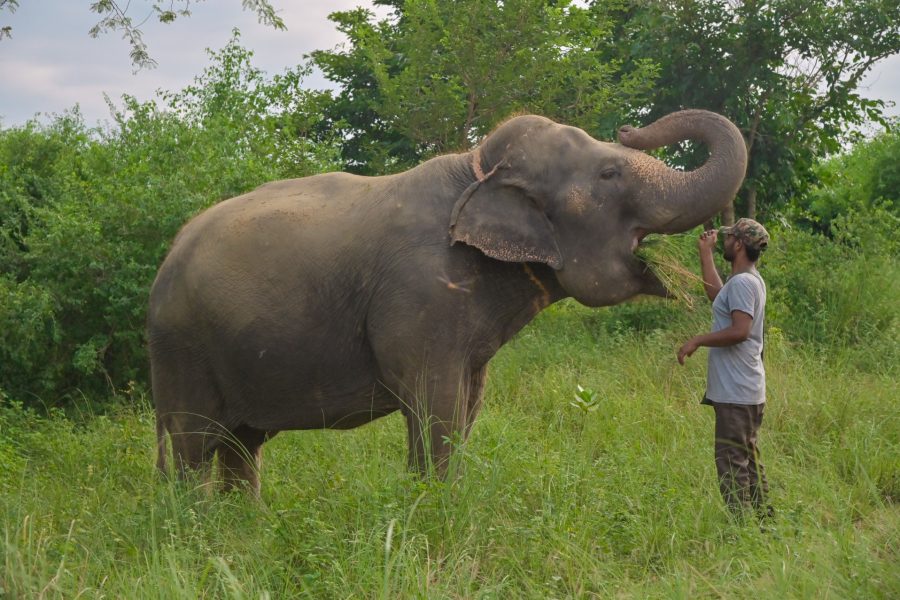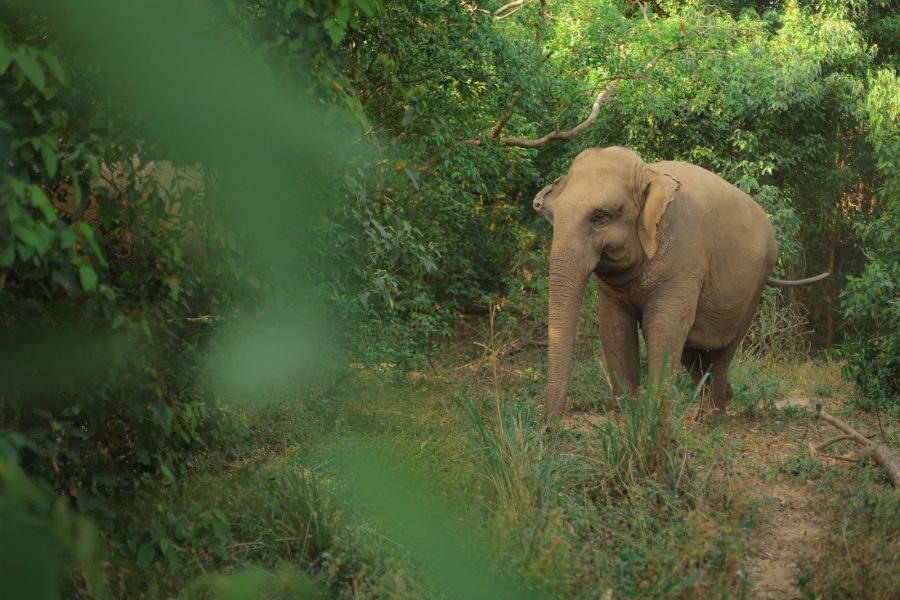Food passes through an elephant’s digestive tract slowly, and may take up to 24 hours to digest. Given the unnatural amount and variety of food that elephants in neglected captivity consume on a daily basis, it is not surprising that they often face grave digestive issues. One of them is colic, which can become debilitating if left untreated. At Wildlife SOS, many elephants have been rescued from abusive conditions where they were deprived of proper nutrition, space for movement, and exercise. The lack of these have led to the development of colic in some. Hence, one of the key responsibilities of caregivers and veterinarians at Wildlife SOS is to routinely check rescued elephants’ behaviour and test their faeces for any signs of the disease.
But before we delve into that, we have to first understand what exactly colic is when it comes to elephants. Colic for elephants is a disease due to obstruction in the intestinal tract caused by undigested food material. Typically characterised by abdominal pain or cysts, colic primarily affects elephants when they ingest unripened fodder or toxic food, have an unbalanced diet, when they overeat or drink inadequate amounts of water. The pain usually arises when a faecal bolus becomes stuck in an intestinal flexure, causing discomfort during elimination.
A thorough study on clinical management of colic has provided desired answers to treating ailing elephants. With early detection of colic symptoms, an effective intervention can take place. At Wildlife SOS, caregivers and night guards have been specially trained to play a vital role in observing elephants for signs of colic such as decreased appetite and behavioural changes. When elephants suffer from colic, they display a certain restlessness. They lie down on the ground and roll on it, bang their trunk on their abdomen, or keep their mouth open for a long time. They often cease consuming food and water, indicating distress. Other symptoms of a colic episode also includes an elephant exhibiting tenesmus — the pachyderm squats frequently in an attempt to expel faeces, which signals that the colic issue has reached a critical stage. In such cases, the administration of probiotics and gradual dietary adjustments help in mitigating the severity of colic and manage the pain the elephant may experience.
In captive environments for elephants that are used for begging or in temples, their keepers overlook feeding measures and make abrupt transitions between fodder sources that can trigger worrying episodes of colic. Insufficient hydration exacerbates the problem, impeding proper digestion and leading to the formation of intestinal blockages. Factors such as dental issues and overall health status further increase susceptibility to colic, particularly among middle to old-aged individuals.
Resident elephants at Wildlife SOS centres like Tara and Laxmi have a history of colic, prompting our staff to take extra caution regarding their diet. Another resident elephant, Priyanka, also suffered from a bout of colic which was promptly addressed by the veterinarians at Elephant Conservation and Care Centre (ECCC). During her colic episode, Priyanka was unable to pass an obstructing dung bolus. The veterinarians conducted a rectal examination of the pachyderm and provided painkillers, laxatives, prokinetic drugs, and vitamin supplements. This medical assistance helped the pachyderm to recover from this condition after a few days.
In the event of a colic episode, veterinarians at Wildlife SOS meticulously go over the elephant’s recent diet to avoid foods causing it in the future. Pain management is the initial focus, with veterinarians administering painkillers to alleviate the elephant’s suffering. In severe cases, where blockages persist, lubricating agents become necessary to be used. Veterinarians therefore administer liquid laxatives that are mixed in the fruit and porridge of the elephants. Including these softens and dislodges the obstructive mass to restore normal digestive functions. Physical activity and ample water intake aid in relieving trapped gases and promoting bowel movement. The caregivers are specifically instructed to provide an extra hour of walk for the elephant after the laxatives are given.

In certain cases, it is also observed that colic is instigated by allergens. As a preventive measure, the veterinary staff also administers antihistamines to treat symptoms of allergies. As the condition improves, caregivers ensure the restoration of the elephant’s gut flora by incorporating additional servings of curd into their diet, followed by a light diet of fruits and vegetables for a few days.
Colic is a serious condition that can rapidly worsen if not addressed promptly. If an elephant fails to defecate within 48 hours, an enema is administered, involving the infusion of lukewarm water through the rectum. Failure to address such critical conditions may result in obstructive colic, where faeces become entirely lodged in the elephant’s intestine, posing a fatal risk to the lives of the pachyderms.
Colic poses a significant threat to the well-being of elephants that were in neglected captivity, necessitating comprehensive strategies for prevention, early detection, and intervention. By prioritising proper nutrition, hydration, and vigilant monitoring, caregivers can mitigate the risk of colic and safeguard the health and welfare of these magnificent animals.
Taking care of every need of an elephant is of utmost importance at the Wildlife SOS centres. You too can join the efforts by supporting us.





